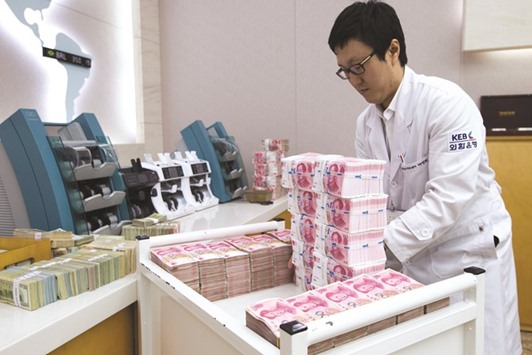Global investors are winding in bets on a yuan devaluation as a dollar rally reverses at the same time as China strengthens support for its currency.
Twelve-month forwards for the offshore yuan rallied 2% so far this month in Hong Kong, outperforming the exchange rate’s 1.2% gain, data compiled by Bloomberg show. The contracts are about 3.5% weaker than the spot rate, a gap that reached a one-month low of 3.3% after widening to a record 5% in January.
All of the Group of 10 currencies have gained ground on the dollar in February as prospects for a US interest-rate increase dimmed.
“The bears are being challenged,” said Sim Moh Siong, a foreign-exchange strategist at Bank of Singapore. “The verdict is out whether the dollar weakness will continue. What’s happening in Asian and emerging-market currencies right now rests on what the Fed is going to do and whether it will hike or not.”
The pullback in bearish bets against the yuan will provide some relief for China, which tightened curbs on capital outflows and burnt through almost $300bn of its foreign-exchange reserves in the last three months propping up the exchange rate. Officials including central bank Governor Zhou Xiaochuan have voiced support for the currency this year and articles in state-controlled media were used to warn that bets against the currency would fail.
Twelve-month forwards for the offshore yuan fell 0.4% to 6.7512 per dollar in Hong Kong, snapping a five-day run of gains. The spot rate declined 0.2% to 6.5144. In Shanghai, where financial markets were shut last week for the Lunar New Year holiday, the currency jumped 1.3% on Monday from its February 5 close before retreating 0.2% on Tuesday to 6.5097. A strengthening of the onshore rate to 6.48 would trigger further capitulation by yuan bears, Sim said.
“As for the shorters, they need to see further pullback in the dollar for them to get out of their yuan trades,” Sim said. “Right now we’re seeing people de-risking rather than putting on new trades.”
Federal Reserve Chair Janet Yellen said last week the central bank was assessing the impact of the swings in the markets on the economy but she doubted that would prompt it to reverse course and cut rates.
There’s about a 30% probability the Fed will raise interest rates in 2016, according to futures data compiled by Bloomberg. The odds were more than 90% at the end of last year.
Societe Generale recommends investors buy the offshore yuan against the Taiwan dollar in the forwards market, saying the trade will perform well even if the Chinese currency depreciates. The French lender predicts the yuan will weaken to 6.80 per dollar in Shanghai by the end of the year.
The odds of the yuan weakening beyond 7 this year have fallen to 23% from 28% at the end of January, options prices show. Forwards and options contracts are derivatives linked to an underlying security such as currencies or commodities.
“The weakening of the dollar lately has put pressure on depreciation expectations with bearish bets getting stopped out,” said Khoon Goh, a senior currency strategist at Australia & New Zealand Banking Group in Singapore.

An employee arranges yuan banknotes at the Korea Exchange Bank headquarters in Seoul. Twelve-month forwards for the offshore yuan rallied 2% so far this month in Hong Kong, outperforming the exchange rate’s 1.2% gain, data compiled by Bloomberg show.
